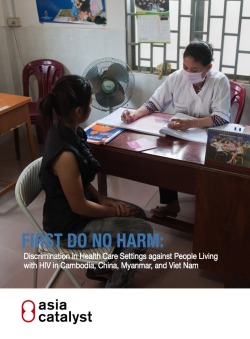Asia: Widespread discrimination in healthcare settings undermining effective HIV response
(Bangkok, Thailand. 29 February, 2016)
 Ahead of the March 1st Global Zero Discrimination Day, people living with HIV in Asia continue to face discrimination in health care settings, impeding their access to health services and denying them the right to health, said Asia Catalyst, an independent organization working to promote the right to health for marginalized communities in Asia, in a new report released today.
Ahead of the March 1st Global Zero Discrimination Day, people living with HIV in Asia continue to face discrimination in health care settings, impeding their access to health services and denying them the right to health, said Asia Catalyst, an independent organization working to promote the right to health for marginalized communities in Asia, in a new report released today.
Based on testimony gathered by eight community-based organizations (CBOs) across the Asia region, the 83 page report, FIRST DO NO HARM: Discrimination in Health Care Settings against People Living with HIV in Cambodia, China, Myanmar, and Viet Nam, details the experiences of 202 women, men and transgender persons living with HIV in Cambodia, China, Myanmar and Viet Nam when accessing health care services. The findings highlight denial of services, segregated waiting areas, refusal to provide surgery, and discriminatory additional fees due to a person’s HIV status.
In Myanmar, Cambodia and Viet Nam, women living with HIV reported denial of sexual and reproductive healthcare services because of their HIV status. This included pressure not to have children and denial of medically accurate information on how to minimize the risk of HIV transmission from mother to child. Women from Cambodia and Myanmar reported they underwent sterilization procedures on the advice of doctors because of their HIV status. All transgender women interviewed in China were denied breast augmentation surgery because of their HIV-status.
“Understanding the human toll is key to addressing the root causes of discrimination and ensuring a holistic response to the HIV epidemic,” said Jebli Shrestha, Regional Program Manager at Asia Catalyst . “This need is magnified when stigma dissuades or even prevents people from seeking care in the first place.”
The report also detailed the legislative environment in all four countries, all of which have policies in place to protect citizens from discrimination, but which are not being uniformly enforced. The organization noted that communities at high risk of HIV, such as sex workers, gay and bisexual men, and transgender women, were doubly discriminated against.
“Today on Zero Discrimination Day we are calling on governments to ensure effective implementation of anti-discrimination provisions and eliminate laws that discriminate and criminalize marginalized communities,” said Charmain Mohamed, Executive Director of Asia Catalyst. “At the very least, medical staff should be given proper training and resources to ensure they appropriately treat all patients, regardless of HIV status, gender identity, sexual orientation or profession.”
The report documented that people living with HIV had better experiences in accessing health services when services were facilitated through community members. Two community organizations in Cambodia found that strong community involvement and active partnership between community HIV organizations, healthcare officials, and government had significantly reduced discrimination and improved access to sexual and reproductive health services for women living with HIV.
“Zero Discrimination Day reminds us of the need for strengthened collaboration between health care providers and communities, as well as stronger representation of communities when developing HIV policies and programs.” said Han Sienghorn and Heng Chheang Kim of ARV User’s Association in Cambodia
For press enquiries, please contact:
Jebli Shrestha, Regional Program Manager, Asia Catalyst (English, Nepali, Hindi)
Tel: 0806076758
Email: jshrestha@asiacatalyst.org
Gareth Durrant, Director of Capacity Building and Community Initiatives, Asia Catalyst (English, Chinese)
Tel: +66947524019
Email: gdurrant@asiacatalyst.org
Asia Catalyst spent 18 months working with 8 community organizations in Cambodia, China, Myanmar and Viet Nam researching and documenting the experiences of people living with HIV when trying to access health services.
The eight CBOs included the Cambodian Community for Women Living with HIV in Cambodia and Kids Sun Group in Viet Nam who specifically focused on researching and documenting discrimination against women living with HIV (WLHIV) when trying to access sexual and reproductive health services in Cambodia and Vietnam; the Consultation Centre for AIDS and Health Services in China who focused on discrimination against transgender women living with HIV when trying to access breast augmentation procedures; Chengdu Tongle Health Counselling Centre in China and the Vietnam Youth Network for HIV/AIDS Prevention in Viet Nam focused on discrimination against men who have sex with men (MSM) living with HIV when trying to access health services in China and Viet Nam; and Aye Myanmar’s Association, Sex Workers’ Association and Myanmar Positive Group focused on discriminatory fees charged to people living with HIV when accessing general health services in Myanmar.




